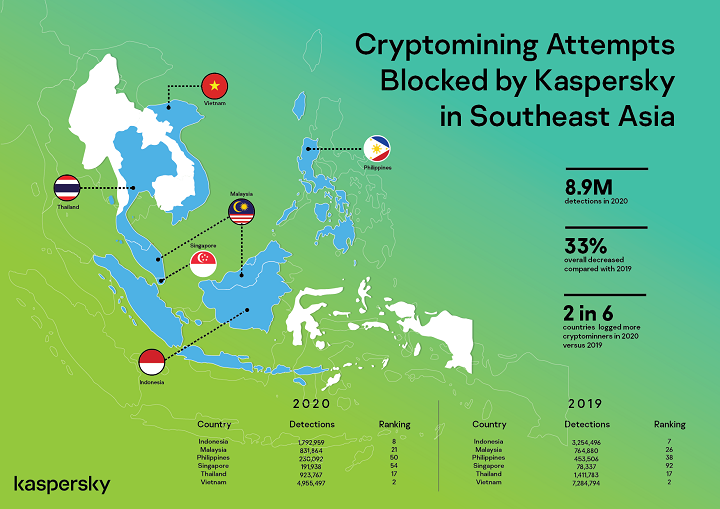[ad_1]
Subscribe to our new Telegram channel for the latest updates and stories.
Cybercriminals are no longer interested in holding your hardware ransom or stealing your credentials. Now they are using cryptocurrency malware to make your smartphones, computers, tablets, and servers work for them.
Kaspersky reported that they blocked 8,926,117 crypto-mining attacks in Southeast Asia. Although it is low compared to the 13, 247,796 detected in 2019, it is still significantly higher than the 2,890,825 phishing attempts and 804,513 ransomware attempts last year.
Crypto-mining
Crypto-mining uses the processing power of devices to mine cryptocurrencies such as Bitcoin, the current favourite untraceable online fiat currency.
Unlike ransomware attacks which tend to be more frightening and require to be dealt with quickly, crypto-miners flourish the longer they are hidden and use this stealth in the long term to profit from the exploit.
Are you infected?
It may be virtual and is not tangible, but it comes at a cost: electricity.
Some tell-tale signs that your device is being used illegally by crypto-miners are:
- Slow system response due to the workload strain
- Increase in power consumption
- Batteries depleting at a faster pace
- Electricity bills skyrocketing
- More significant data usage
Kaspersky notes that if you’re a business owner and your staff are working remotely because of the pandemic yet you find your office power bill unusually high, check your IT backend. There may be crypto-miners using your business resources, at your expense.
“SMBs normally have a relaxed attitude towards information security and so the main damage from crypto-mining is expected to be felt by this sector,” said Yeo Siang Tiong, General Manager for Southeast Asia at Kaspersky.
“Cryptocurrencies continue to attract investor and user attention due to the continued spike in its prices so we really caution SMBs not to underestimate the possibility that crypto-mining will remain to be a serious cyber threat”.
The situation in SEA

When compared to other countries in Southeast Asia, Malaysia ranked fourth with 831,864 detected cases. The highest is in Vietnam with 4,955,497 cases, and Singapore had the lowest cases of crypto-mining with only 191,938 cases.
Share your thoughts with us on TRP’s Facebook, Twitter, and Instagram.
[ad_2]


